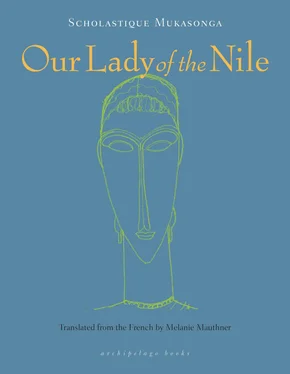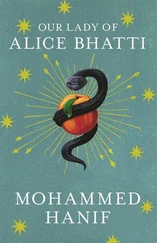The war council met again in Mother Superior’s office: present were Mother Superior, the mayor, Sister Bursar, and Father Herménégilde, who’d left the girls under Sister Gertrude’s watchful eye. As both victim and witness, Gloriosa was invited to attend and recount the attack for the mayor’s benefit: the supposed Inyenzi were now more numerous and violent than ever, and Gloriosa lifted her dress to show them all the scratch marks covering her thighs. Modesta, still silent though now sobbing for real, was led to the infirmary so that Sister Angélique could look after her. The mayor declared that he’d been able to contact the Prefect, who then alerted the army base. The colonel was going to immediately send fifty soldiers under Lieutenant Gakuba’s command. Meanwhile, they placed militants at the strategic points and dispatched a patrol of militants to the shopping district, led by a gendarme. Mother Superior gave the girls permission to return to their dorms and get into bed, but with their clothes on.
They all waited. The night was particularly dark and the mountain was still. The patrol returned from the village. A few dogs stirred, and the mixture of plaintive and furious barking took a while to quell. Soon after midnight two trucks rolled up, packed with soldiers. They immediately took up their positions around the lycée. The young lieutenant in command conferred with the mayor and Mother Superior in her large office. Gloriosa retold her tale, this time adding that she thought she had recognized the voice of one of those who’d attacked them, she wasn’t entirely sure, but it could well have been Jean Bizimana, the son of Gatera, the Tutsi who had a stall at the market. The lieutenant said that the Tutsi were never far from the Inyenzi, and that there was no doubt that the bandits, who had come from abroad, were now hiding with them. He would send out patrols to search their compounds, taking the militants as their guides. Jean Bizimana would be arrested immediately. “When it comes to the Inyenzi, there’s never a moment to lose,” said the lieutenant.
The operations ordered by the lieutenant were promptly carried out. The patrol chiefs returned an hour later to report to him in the presence of Mother Superior, the mayor, and Gloriosa, who had refused to go and lie down in the guest room they had offered her, even though it was the finest one, Monsignor’s room. Jean Bizimana had been arrested without offering any resistance, amid the screams and tears of his parents, his brothers, and his sisters. The soldiers had interrogated him with the intensity needed to make him give up his accomplices. He admitted nothing. They were going to send him to the huge prison in the north of the country. “There’s little chance we’ll see him hanging around my district again,” said the mayor, laughing.
The soldiers had ransacked the few enclosures still inhabited by Tutsi. They’d conscientiously ripped open granaries, smashed jars, questioned every occupant, even the children. In vain. The Inyenzi had fled without a word. “So,” said the lieutenant, “two brave young ladies succeeded in putting them to flight. Still, it’s a shame we couldn’t catch a few. But it was a good operation: the Tutsi need constant reminding that here in Rwanda they’re merely cockroaches, Inyenzi.”
Gloriosa stayed in Monsignor’s room for a few weeks — until the pilgrimage, as she’d requested. They couldn’t refuse anything to a girl who had shown so much courage, and whom Father Herménégilde had compared to Joan of Arc in one of his sermons. The two lycée girls’ exploits, Gloriosa’s especially, were celebrated in even the highest echelons of the Party. “Two heroic lycée girls deflect band of dangerous criminals come to sow chaos in our country,” ran the newspaper headline. Gloriosa had become the heroine who had saved the lycée, perhaps even the entire country. The nuns and the teachers took every opportunity to compliment her: the gaggle of schoolmates that clustered around her grew considerably larger, although some avoided chatting with her for too long, for fear of committing some sort of faux pas. Only Goretti kept her distance, allowing herself to covertly express to those of her friends who remained loyal some doubt as to the authenticity of Gloriosa’s exploits.
Modesta hoped that Gloriosa would renounce her intention to mutilate the statue of Our Lady of the Nile, for fear of compromising her newfound fame, but one day in Sister Lydwine’s class, Gloriosa whispered to her, “Don’t forget, Sunday, we’re off to the Batwa.”
The Batwa village comprised a dozen disheveled little huts in the middle of a sparse banana grove. On a well-flattened stretch of ground, a large blackened circle marked the site of the fire where the clay pots were baked a few days before market. All around stood piles of potsherds, like low, crumbling pyramids.
Seeing the two girls approach, a swarm of squealing, naked children fled, their balloon-bloated stomachs streaked clay white. The village felt empty, strangely silent. They walked along the paths leading to the huts and finally came across a woman molding a pot. From a base made out of a broken pot, upon which sat a pile of clay, she brought forth — coil upon coil — the smooth, rounded belly of a stew pot. The potter was so absorbed in her task that when Gloriosa and Modesta drew near, she didn’t look up. They gently coughed to get her attention. After a while, without ceasing her work or looking at them, the woman mumbled: “If you’re here to buy a pot, they’re not ready yet. They’re drying. Come by the market, I’m always there. Then you can buy as many pots as you want.”
One by one, the kids who’d run off at the sight of the girls came out of their hiding places, drew closer, surrounded them, pressing tight, trying to touch them. Adults, men with beards, and yakking women slowly mixed in with the children. “Tell them to step back, I don’t want them to touch me,” said Gloriosa to the potter, clutching the folds of her skirt. “Get back,” said the potter, as an old man with a pointy white beard emerged from a hut and pushed away the most brazen with his staff. He came and sat down by the potter. Gloriosa explained what she wanted: a wad of clay, which one of the teachers at the lycée had asked for. The potter and the old man didn’t seem to understand. Gloriosa repeated her request.
“So you want to be a potter,” said the old man, bursting with laughter. “You want to do what we Batwa do. Are you a Mutwa? You’re quite big for a Mutwa!”
“Give me one of those clay sausages,” Gloriosa insisted. “I’ll pay you the price of a whole pot, a jug, a large jug.”
Conferring in low voices, the woman and the old man gave it some thought, now and again glancing up at Gloriosa and Modesta with mocking grins.
“Two jugs,” said the potter at last, “two large beer jugs, that’s my price, and you’ll get your sausage. Twenty francs, that’ll be twenty francs.”
Gloriosa handed the potter a twenty-franc note, which the woman immediately crumpled into a ball and thrust into the knot of her wraparound. She called over one of the children, who went off to pick her a tuft of grass. This she wove into a kind of net in which she wrapped one of the clay coils with which she made her pottery.
“Here,” she said, “but don’t tell anyone what’s in here. Otherwise, they’ll say you’ve become a Mutwa.”
Gloriosa and Modesta hurried away as fast as they could, with a crowd of joyous, shouting, singing, dancing villagers following them as far as the track.
When they were finally alone again, Gloriosa opened the grass envelope and gazed at the clay coil for a long while.
“Look,” she said, “there’s enough here to correct the nose of every Virgin in Rwanda!”
Читать дальше












